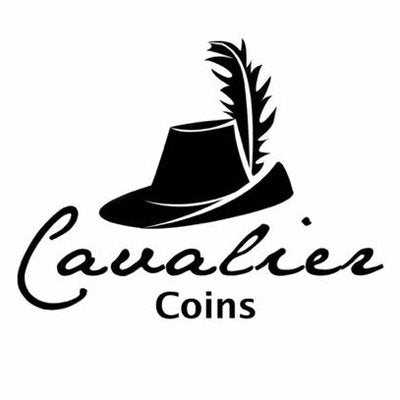Before you even think about where to sell your old coins, a little prep work can make a massive difference to the final price you get. Taking the time to understand what you have, its condition, and how to present it properly is what separates a casual seller from an informed one. This groundwork is genuinely the key to unlocking your collection’s true value.
Your First Steps Before Selling Old Coins
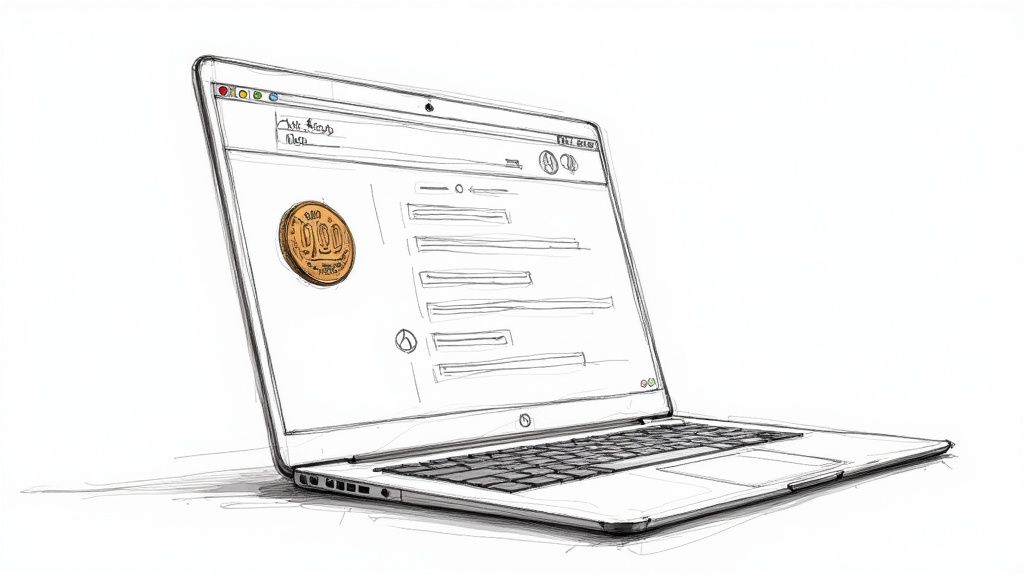
Jumping straight into selling without knowing what you're holding is like walking into a negotiation blindfolded. It's a surefire way to undervalue rare pieces or accept a lowball offer for a collection worth far more. The first, most crucial step is simply to get to grips with what you actually possess.
Create a Simple Inventory
First things first, get organised. You don't need any fancy software; a basic spreadsheet or even a simple notebook will do the job perfectly. Start by grouping your coins in a way that makes sense, perhaps by country, denomination, or the type of metal.
For each coin, jot down a few key details:
- Year of Issue: The date stamped on the coin.
- Denomination: Its face value (e.g., penny, half crown, sovereign).
- Mint Mark: A tiny letter indicating where it was minted (if you can see one).
- Obvious Condition Notes: Make a note of any significant damage, heavy wear, or any unusual features.
This simple list gives you a clear overview, helping you spot the potential highlights and speak confidently with any potential buyers. Think of it as your road map for the entire selling process.
The Golden Rule: Do Not Clean Your Coins
I can't stress this enough. It might be incredibly tempting to polish up a tarnished old silver coin to make it shine, but this is the single biggest mistake you can make. Serious collectors and dealers prize a coin's natural patina – that's the surface layer that develops over decades or even centuries.
Wiping that away with abrasive polishes or chemicals instantly strips a coin of its history and, in turn, most of its numismatic value.
A coin's history is written on its surface. An aggressive cleaning erases that history, often reducing a valuable collectable to its basic metal worth. Always, always present coins just as you found them.
Understand the UK Market Landscape
Here in the UK, the path for selling old coins is pretty well-trodden, with several reliable options available. Specialist dealers and reputable auction houses are often the best bet for serious collections.
For instance, established traders like Chards Coin and Bullion Dealer offer transparent pricing, which is great for bullion and investment-grade pieces. Even The Royal Mint itself provides an official channel with guarantees of authenticity.
Online platforms like eBay UK are popular for more common collectables, but you'll need to vet buyers carefully. For particularly high-value items, specialist coin fairs and auctions can bring in significant premiums, especially for coins that have a verified history (provenance). It’s worth taking a look at a complete guide to UK collectable coins to get a better feel for your options. A bit of initial research helps you match your coins to the right marketplace from the very start.
Choosing the Best Place to Sell Your Coins
Deciding where to sell your old coin collection is probably the most important choice you'll make. The venue you pick can have a massive impact on the final price you get, how quickly you sell, and your overall experience. Truthfully, there’s no single "best" place for everyone; it all comes down to what you have.
A rare gold sovereign and a biscuit tin full of mixed-date pennies need completely different sales strategies. The sovereign would likely thrive in the competitive bidding of a specialist auction. On the other hand, the pennies are a much better fit for a local dealer who can buy them by weight or as a bulk lot. Understanding this distinction is key.
Local Coin Shops and Dealers
For most people, the local coin shop is the most obvious and accessible option. It's a pretty straightforward deal: you bring your coins in, and you often leave with cash in hand. This approach is fantastic for speed and simplicity, making it perfect for lower-value, common coins or if you just need the money quickly.
Of course, that convenience comes at a cost. A dealer is running a business and needs to make a profit, so their offer will always be below the coin's retail value—think of it as a wholesale price. For a deeper dive into what to expect when you walk into a shop, this guide on how to sell old coins offers some great additional insights.
This image breaks down some of the typical figures you might see when working with a local shop.
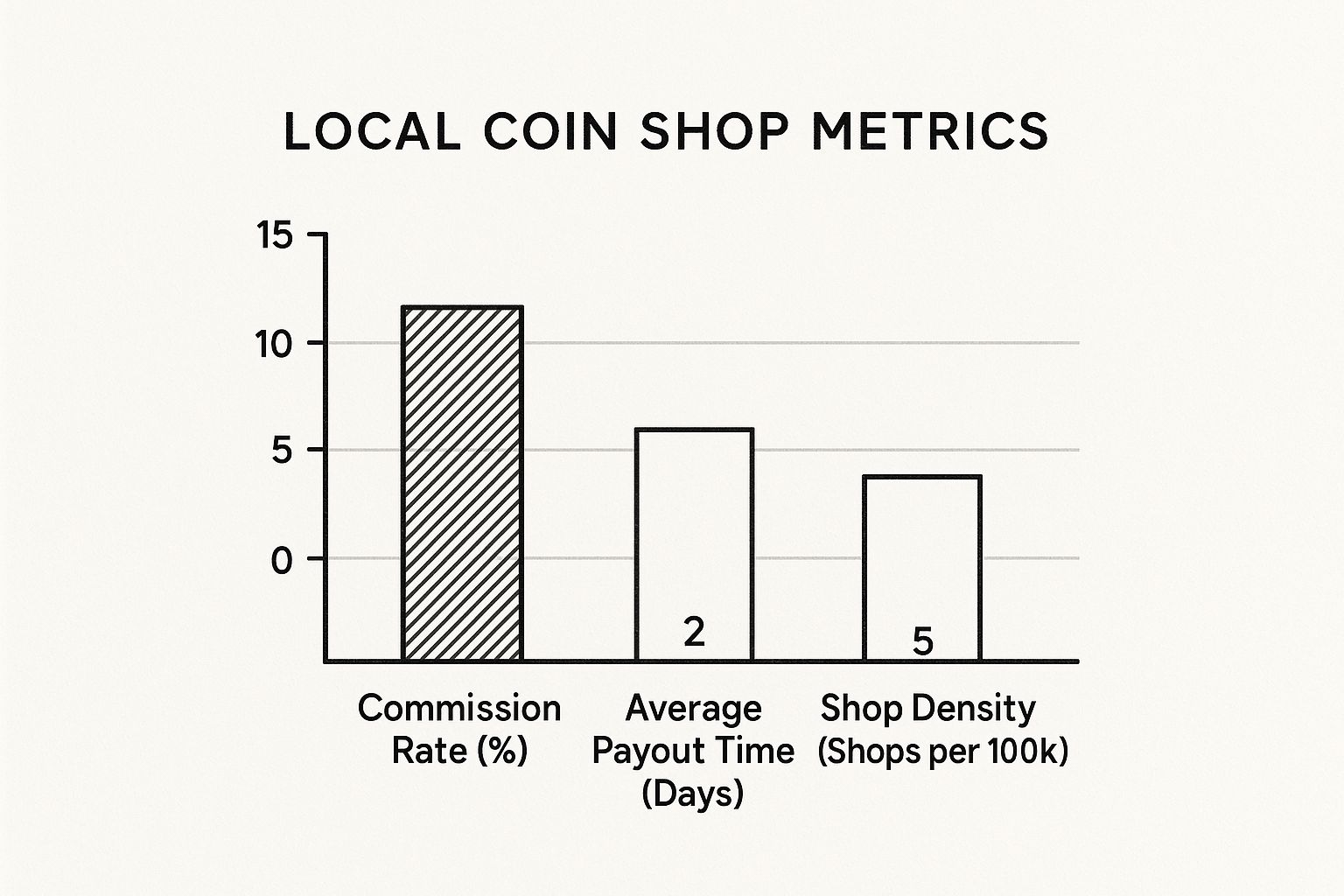
As you can see, while their commission rates are reasonable, the payout time is incredibly fast, which really cements their role as the go-to for a quick sale.
Specialist Auction Houses
If you have a feeling you’re holding onto something particularly rare or valuable, an auction house is often the best way to get the maximum price for it. Reputable auctioneers attract serious, dedicated collectors from all over the world who are prepared to pay top-tier prices for premium items. That competitive bidding environment can push the final sale price way beyond the initial estimates.
The downside? The process is a lot slower. From the moment you consign your coin to the auction day and final payment, it can easily take several months.
An auction house will charge a "seller's premium," which is a percentage of the final hammer price. You might also face extra fees for photography and cataloguing. Always read their terms and conditions carefully before you commit.
This route really isn't suited for common coins, as the fees would probably swallow up any profit. But for a key-date coin in fantastic condition, it’s the gold standard.
Online Marketplaces
Platforms like eBay throw the doors open to a massive global audience of buyers, putting you in the driver's seat. You get to set the price, write the description, and handle the shipping yourself. This can often get you a price much closer to its retail value because you're selling directly to another collector.
The trade-off, however, is the sheer amount of work involved. You have to:
- Take high-quality, crystal-clear photos of both sides of the coin.
- Write an accurate, honest description, being sure to mention any flaws.
- Research what similar coins have sold for to set a realistic price.
- Pack the coin securely and post it once it sells.
You’re also the one who has to deal with customer questions and any potential disputes. And don't forget, the platform will take a final value fee from your sale. This path offers the highest potential reward but also demands the most effort and carries the most risk. A good tip is to always check a potential buyer's feedback and reputation before you finalise a deal.
Comparing UK Coin Selling Venues
To make sense of all these options, it helps to see them side-by-side. Each venue has its unique strengths and is better suited for certain types of coins and sellers.
| Venue | Best For | Pros | Cons |
|---|---|---|---|
| Local Coin Dealer | Common coins, bullion, quick cash sales, bulk collections. | Fast transactions, immediate payment, no shipping required. | Lower prices offered (wholesale value). |
| Specialist Auction House | Rare, high-value, and key-date coins. Graded coins. | Potential for very high prices due to competitive bidding. | Slow process (months), high commission/fees. |
| Online Marketplace (e.g., eBay) | Mid-value coins, selling directly to collectors. | Large audience, potential for higher retail prices, full control. | Time-consuming, seller fees, risk of disputes/fraud. |
Ultimately, the right choice depends on your priorities. If speed is what you need, a local dealer is unbeatable. If maximising the value of a rare piece is your goal, then an auction house is your best bet. And if you're happy to put in the work for a better return on mid-range coins, an online marketplace could be perfect.
Mastering the Online Coin Marketplace
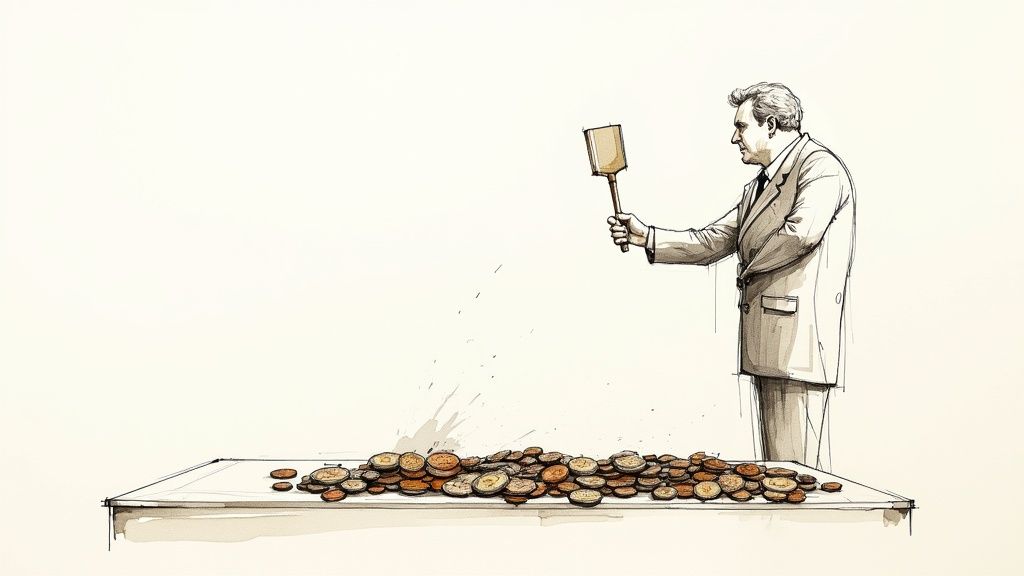
Taking your old coins to the online marketplace opens them up to a global audience of collectors. It's a huge opportunity. But making a successful sale on platforms like eBay or specialist numismatic forums takes more than just snapping a picture and hitting 'post'. To attract serious buyers, you need to build trust and show them exactly what you've got.
The first step? Excellent photography. Forget a quick photo on your phone under a dim lamp. You need to place the coin on a plain, neutral background and use bright, indirect light to kill any glare.
Get sharp, high-resolution pictures of both the obverse (the 'heads' side) and the reverse (the 'tails'). And don't forget a clear shot of the coin's edge. This is what seasoned collectors will zoom in on, and poor photos are an instant red flag.
Creating a Listing That Sells
Your description is just as important as your photos. Honesty is everything. State the coin's year, denomination, and any unique marks clearly. Be completely upfront about its condition – mention every scratch, area of wear, or tiny imperfection you can see. A buyer who gets a coin that's exactly as you described it is a happy one. One who feels you've hidden something will never buy from you again.
When it comes to the price, do your homework. Before you even think about listing, search for your exact coin on the platform and—this is the crucial bit—filter the results to see "sold listings." This tells you what people have actually paid for a coin like yours recently, which is a much better guide than what people are asking for. This data will help you pick your sales strategy:
- Fixed Price: This works best when you have a solid idea of your coin's market value and you'd be happy with a specific price.
- Auction Format: This is the way to go if you have something rare or in high demand. A bidding war could drive the final price far higher than you expected.
And remember to factor in the costs. Platform fees, payment processing, and secure postage all take a bite out of your profit. Add it all up beforehand so there are no nasty surprises when the sale is done.
Staying Safe and Secure
The global coin market is booming, valued at USD 10.74 billion in 2024 and projected to more than double by 2032. For UK sellers, this growth is fantastic news, creating a bigger pool of serious collectors. But as the market grows, knowing how to sell safely becomes non-negotiable. You can read more about these global coin collection market trends to get a sense of the bigger picture.
For any coin with real value, always use a tracked and insured postage service. It’s non-negotiable. This protects both you and the buyer if it goes missing in transit. Also, stick to the secure payment methods recommended by the platform; they usually offer seller protection against common scams.
How to Get a Professional Coin Valuation
Knowing the true value of your coins is your greatest advantage when you're deciding where to sell old coin collections. Without an accurate valuation, you're essentially negotiating in the dark, unable to tell a fair offer from a poor one. This knowledge is what empowers you to walk away from a bad deal and confidently accept a good one.
The valuation process comes in a few different flavours. The most common is a quick, informal estimate from a local coin dealer. This is usually free and serves as a rough assessment, often leading to an immediate offer to buy your coins. It's a decent starting point for getting a general idea, but just remember it’s not an unbiased appraisal.
Formal Appraisals vs Dealer Estimates
A formal, written appraisal is a different beast altogether. This is the kind of detailed valuation you’d need for insurance, estate planning, or when you’re preparing to sell a particularly high-value collection through a major auction house. A certified appraiser will meticulously research each coin and provide a comprehensive document outlining its value.
A formal appraisal provides a defensible, market-based valuation that holds up for legal and insurance purposes. While it comes at a cost, it's an essential investment when dealing with rare or exceptionally valuable coins.
To find a reputable appraiser in the UK, a great place to start is with organisations like the British Numismatic Trade Association (BNTA). Members are held to a strict code of ethics, which gives you a layer of security and ensures you're dealing with a recognised professional.
Professional Grading Services
For truly special coins—perhaps a rare sovereign in pristine condition or a key-date Victorian crown—you should seriously consider professional third-party grading. This is where companies like the Professional Coin Grading Service (PCGS) or Numismatic Guaranty Company (NGC) come in.
These services authenticate, grade, and encapsulate your coin in a sealed, tamper-proof holder, often called a "slab." Here’s why that matters:
- Authentication: They guarantee your coin is genuine, removing any doubt for potential buyers.
- Standardised Grading: They assign a precise numerical grade (from 1 to 70) to the coin's condition, which is recognised globally.
- Increased Value: A high grade from a top service can dramatically increase a coin's market value, often by several multiples.
Getting a coin slabbed costs money and takes time, so it's a step reserved for coins where the potential increase in value justifies the expense. For those looking to understand the nuances, we offer some expert coin collection valuation tips for UK coins that can help you decide which path is right for your collection.
This process transforms your coin from a collectible into a certified, liquid asset, making it far easier to sell for its maximum worth.
Unlocking the Value of Modern Rare Coins
When you hear someone talk about “old coins,” your mind probably jumps to ancient Roman denarii or maybe a gold sovereign from Queen Victoria’s reign. But you might be surprised to learn that some of the most valuable finds could be jingling in your pocket right now.
The market for modern commemorative coins, especially those from The Royal Mint, is buzzing with activity. A coin that looks perfectly ordinary can turn out to be a real collector's item.
It isn't age that drives up the price of these modern pieces. It all comes down to one thing: scarcity. The key is a coin’s mintage figure—that is, how many were struck and put into circulation. When The Royal Mint releases a coin with a particularly low mintage, it immediately becomes a hot ticket for collectors desperate to complete their sets.
Spotting the Modern Treasures
The most legendary example of this is the Kew Gardens 50p. It was minted back in 2009 with a tiny run of just 210,000. Finding one in your change today is like finding a winning lottery ticket; they often sell for hundreds of times their face value.
But it’s not just the Kew Gardens 50p. Other modern coins to look out for include certain £2 pieces, like the 2002 Commonwealth Games series. For that particular set, the Northern Ireland variant is especially hard to come by.
If you want to get good at this, you need to keep your finger on the pulse of what makes a modern coin rare. That means paying attention to a few things:
- Mintage Figures: Collector websites and online forums are great resources for lists of the rarest coins currently in circulation.
- Design Variations: Keep an eye out for small errors or subtle changes in a coin's design, as these can create an instant rare variant.
- Commemorative Themes: Coins that celebrate major national events or anniversaries always seem to catch the public's imagination and are popular with collectors.
Capitalising on New Releases
The market for brand-new rare coins is a unique opportunity for a quick and profitable sale. Take, for example, The Royal Mint's plan to issue just 170,000 of the 2025 Bee £1 coin into circulation. That announcement alone has created a frenzy.
This incredibly small figure instantly makes it one of the rarest modern coins, fuelling huge demand as collectors bet on its value shooting up. Selling these kinds of coins right after they’re released, either on specialised online platforms or to dealers, can bring in a very nice premium. You can explore the details about this rare £1 coin to see what the buzz is about.
Timing is absolutely crucial when selling modern rare coins. You'll often get a much better price by selling into that initial wave of excitement, before the market gets flooded.
Finding the right place to sell these modern gems is just as important as knowing how to spot them in the first place. Sure, they can do well on general marketplaces, but the real money is on specialist forums and dedicated coin-selling websites.
These are the places where the serious, knowledgeable collectors hang out, and they’re often willing to pay top price for that one specific coin they need. If you're weighing your options, our guide on the top options for selling your coins in 2025 breaks down all the best venues.
Common Questions About Selling Old Coins
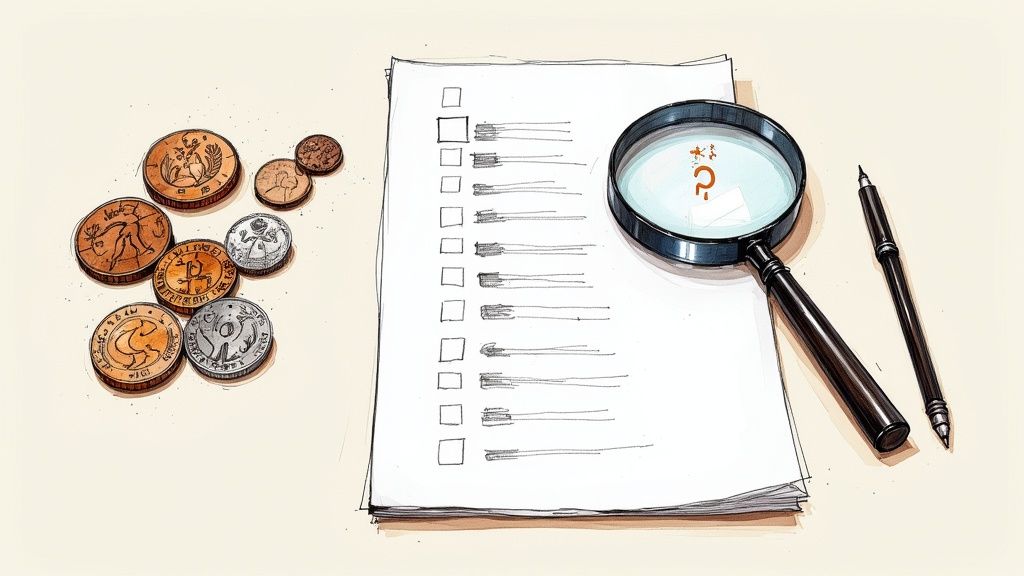
Starting the process of selling a coin collection always brings up a few practical questions. It can feel a little intimidating, especially when you're handling items that hold both sentimental and real financial value.
Here, we'll run through some of the queries we hear most often, giving you clear, straightforward answers. The goal is to help you move forward with confidence, armed with the knowledge you need to have productive conversations with dealers and auction houses.
How Much Does It Cost to Get a Coin Collection Valued in the UK?
The price of a valuation really comes down to what you need it for. Most local coin dealers will give you a free, informal verbal appraisal. This is usually a quick look-over, often done in the hope you might decide to sell your collection to them. It's a fantastic way to get a rough idea of what you're working with.
However, if you need something more formal, like a written valuation for insurance or probate, you can expect to pay a fee. There are a couple of common ways this is charged:
- An hourly rate: Depending on the appraiser's experience, this can be anywhere from £50 to £150 per hour.
- A percentage of the value: Some valuers charge a small percentage of the collection's total appraised worth.
Professional third-party grading services like PCGS or NGC charge on a per-coin basis. Those fees will change based on the coin’s value and how quickly you need it done. The key takeaway? Always confirm any and all fees upfront before you agree to a service.
Is It Better to Sell Old Coins Individually or as a Collection?
This is a classic dilemma, and the right answer depends entirely on what’s actually in your collection.
If you have a few real standout coins—high-value 'key dates'—mixed in with a lot of very common ones, you will almost always make more money by selling the rare coins on their own. This lets you find specialist collectors or the right auction for your best pieces.
Once you’ve cherry-picked the gems, you can sell the rest as a bulk lot to a dealer. They are much better equipped to process large numbers of lower-value coins. Selling a mixed-quality collection in one go usually means the buyer will anchor their offer on the lower-grade material, which pulls down the overall price you receive.
The big exception to this rule is a complete, cohesive set. For instance, if you have a full run of pennies from a specific monarch's reign, all in a similar condition, the set itself can be worth more than the sum of its parts and should definitely be sold as one unit.
I Inherited a Coin Collection and Know Nothing About It. Where Do I Start?
Finding yourself with an inherited collection can feel overwhelming. The first step is simple but absolutely critical: whatever you do, do not clean the coins. Any attempt to polish or scrub them can cause irreversible damage to their surfaces, completely destroying their numismatic value.
Your next move is to get organised. Start by grouping similar coins together—maybe by country, metal type, or even just by size. Take a few clear photos of any coins that look especially old, unusual, or seem to be in pristine condition.
With a basic inventory in hand, your best bet is to find a reputable dealer for an initial chat. Look for a member of a recognised trade body like the British Numismatic Trade Association (BNTA). Be upfront about your lack of expertise; a trustworthy professional will respect that and guide you, helping to spot any important pieces and advising on the best way forward.
What Are the Most Common Mistakes to Avoid When Selling Old Coins?
Beyond the cardinal sin of cleaning coins, a few other common pitfalls can catch sellers out. One of the biggest is having unrealistic price expectations. It’s easy to see a perfect, professionally graded version of a coin online and assume yours is worth the same. But in the world of coins, condition is everything.
Another frequent error is selling to the very first person who makes you an offer without getting a second opinion. Patience really is a virtue here. A quick offer isn't always the best one.
Finally, if you're selling online, poor-quality photos and vague descriptions will put off serious buyers and lead to disappointing results. Taking the time to do your homework and present your coins properly is the single best thing you can do to ensure a successful sale.
At Cavalier Coins Ltd, we understand the passion that goes into every collection. Whether you're looking to sell a cherished family inheritance or make room for new acquisitions, our expertise can guide you through the process. Explore our services and see how we can assist you today.
